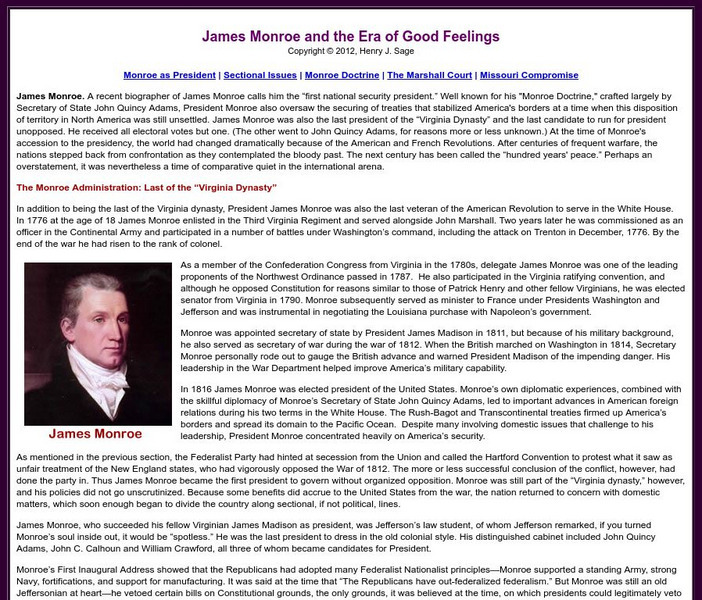Hi, what do you want to do?
Curated OER
Consequences of the Sedition Act
Students research and discuss the consequences of the Sedition Act. They illustrate the difficulty of balancing security needs and personal freedom using an example from John Adams's presidency.
National Endowment for the Humanities
Lesson 2: The United States, France, and the Problem of Neutrality, 1796–1801
While the French Revolution could be considered inspired by the American Revolution, it created thorny problems for the new United States. Should the United States get involved and be drawn into a European drama? Was the US strong...
Curated OER
From the President's Lips: The Concerns that Led to the Sedition (and Alien) Act
Young scholars research and briefly summarize the international situation during John Adams's presidency. They list the concerns that led to the Sedition Act and describe it.
Curated OER
The Monroe Doctrine: Whose Doctrine Was It?
Was James Monroe the sole contributor of the Monroe Doctrine? Young scholars study the doctrine and cite evidence to show contributions of John Quincy Adams and Thomas Jefferson in its formulation.
Curated OER
The Era of Good Feelings
Setting the context for the first part of the 19th century, the slides presented here display the "Era of Good Feelings," including the presidencies of Monroe and Adams. Maps and photographs help students to contextualize the concepts of...
National Endowment for the Humanities
The Monroe Doctrine: A Close Reading
Students identify specific passages in the Monroe Doctrine to events in early U.S. diplomacy.
Curated OER
The Monroe Doctrine: U.S. Foreign Affairs (circa 1782-1823) and James Monroe
Learners read the test of the Monroe Doctrine then list the key points and discuss its central tenets.
Curated OER
Thomas Jefferson on the Sedition Act
Students research and cite arguments Jefferson used in objecting to the Sedition Act. They discuss Jefferson's opinion on how constitutional questions about the Sedition Act could be resolved.
National Endowment for the Humanities
Lesson 2: The Debate in Congress on the Sedition Act
Pupils research and discuss the provisions in the Constitution that supported the arguments for and against the Sedition Act. They articulate objections to and arguments in favor of the Sedition Act.
Curated OER
The U.S. Presidents
Students identify the Presidents of the U.S. by their physical characteristics and their impact on America. For this Presidents lesson plan, students read about each President, look at their pictures, and identify each of them based on...
Curated OER
George Washington on the Sedition Act
Students investigate the Sedition Act and George Washington's position on the act. In this United States Colonial history lesson, students read about George Washington's position on the Sedition Act. Students then participate in a...
Curated OER
Lesson Plan: Early Political Parties
Students examine the platforms of early political parties in the United States. In this political parties instructional activity, students discover details regarding the attributes and ideals of the federalists and the...
Curated OER
The Inaugural Speech: Setting The Tone For The Administration Of A President
High schoolers investigate the Inaugural Speech of the President of The United States while comparing two speeches. They conduct research to find the two speeches on the internet and look at them side by side. The lesson includes...
University of Virginia
Miller Center at Uva: u.s. Presidents: John Adams: A Life in Brief
A good look at John Adams as president and the struggles he had both domestically and in foreign affairs. Read about how he kept America out of war and his political isolation because of his hard-held beliefs.
PBS
Pbs Learning Media: The Presidents Biography 2. John Adams
A concise biography of President John Adams featuring his professional career. Sections highlight the era, domestic policy, foreign affairs, and his presidential politics.
University of Virginia
Miller Center at Uva: u.s. Presidents: John Quincy Adams: Foreign Affairs
Read about the little that was accomplished in Adams' presidency in terms of foreign affairs, primarily because of Adams' success in diplomacy as Monroe's Secretary of State.
Digital History
Digital History: The Presidency of John Adams
John Adams, early revolutionary and founding father, became the second president of the United States, only to face difficult foreign policy problems. Read about the XYZ Affair and the Federalists' preparation for war with France.
University of Virginia
Miller Center at Uva: u.s. Presidents: James Monroe: Foreign Affairs
Read a great summary of U.S. foreign policy in the Monroe presidency. Find out about the treaties agreed to and the unilateral issuing of the Monroe Doctrine.
Henry J. Sage
Sage American History: James Monroe and the Era of Good Feelings
A complete look at the administration of James Monroe and the policies of the Era of Good Feelings. You can read about the domestic policies, foreign affairs, and important decisions of the Supreme Court made during the Monroe...
Other
John Mc Adams: Marquette: Kennedy and the Cold War
Discusses John F. Kennedy and his role in the Cold War.
PBS
Pbs Learning Media: The Presidents Biography: 6. John Quincy Adams
A brief biography featuring the professional life of President John Quincy Adams. Find details of the era, domestic policy, foreign affairs, and his presidential politics.
Gilder Lehrman Institute of American History
Gilder Lehrman Institute: History Now: The Early Republic
[Free Registration/Login Required] Read about the tremendous growing pains faced by the new republic of the United States from the presidency of George Washington up to the election of Thomas Jefferson. Find out about the domestic...
Digital History
Digital History: Sedition Act and the Virginia and Kentucky Resolutions [Pdf]
Read about the foreign policy problems the United States was having at the beginning of the Adams administration. See what led up the the passage of the Sedition Act and some ramifications of it, and the Kentucky and Virginia Resolutions...
US Department of State
Office of the Historian: The United States and the French Revolution
The French Revolution had political consequences in the United States. It forced us to adopt a clear foreign policy of neutrality and to pass legislation concerning immigration. Examine how Jefferson and Adams responded to the French...

























